Installation and Maintenance of Heat Pumps
Unveiling Heat Pump Refrigeration Cycle’s Latest Tech Updates

We’re excited to showcase the newest developments in heat pump refrigeration cycle technology. Get ready to be astonished by the latest enhancements in compressors, condensers, evaporators, expansion valves, defrosting methods, control systems, and heat recovery.
Our precise and detailed article will take you on a technical journey, painting a picture of the future outlook for heat pump refrigeration.
Join us as we serve you with the most up-to-date information in this ever-evolving field.
Key Takeaways
- Heat pump compressor technology has advanced with the introduction of variable speed compressors and scroll compressors, resulting in higher efficiency and reduced operational costs.
- Heat pump condenser design has been enhanced with features such as enhanced heat transfer surfaces, microchannel technology, corrosion-resistant materials, and variable speed fans, leading to better control, improved energy efficiency, and easier installation.
- Heat pump evaporator technology has seen innovations in heat transfer efficiency, energy consumption reduction, compact coil designs, advanced materials, and optimized refrigerant flow for uniform heat transfer, resulting in improved performance.
- Heat pump expansion valve design has been upgraded with features like variable orifice size, enhanced energy efficiency, intricate construction, and improved refrigerant flow regulation, contributing to overall system efficiency and performance.
Overview of Heat Pump Refrigeration Cycle
What are the key components and functions of the heat pump refrigeration cycle?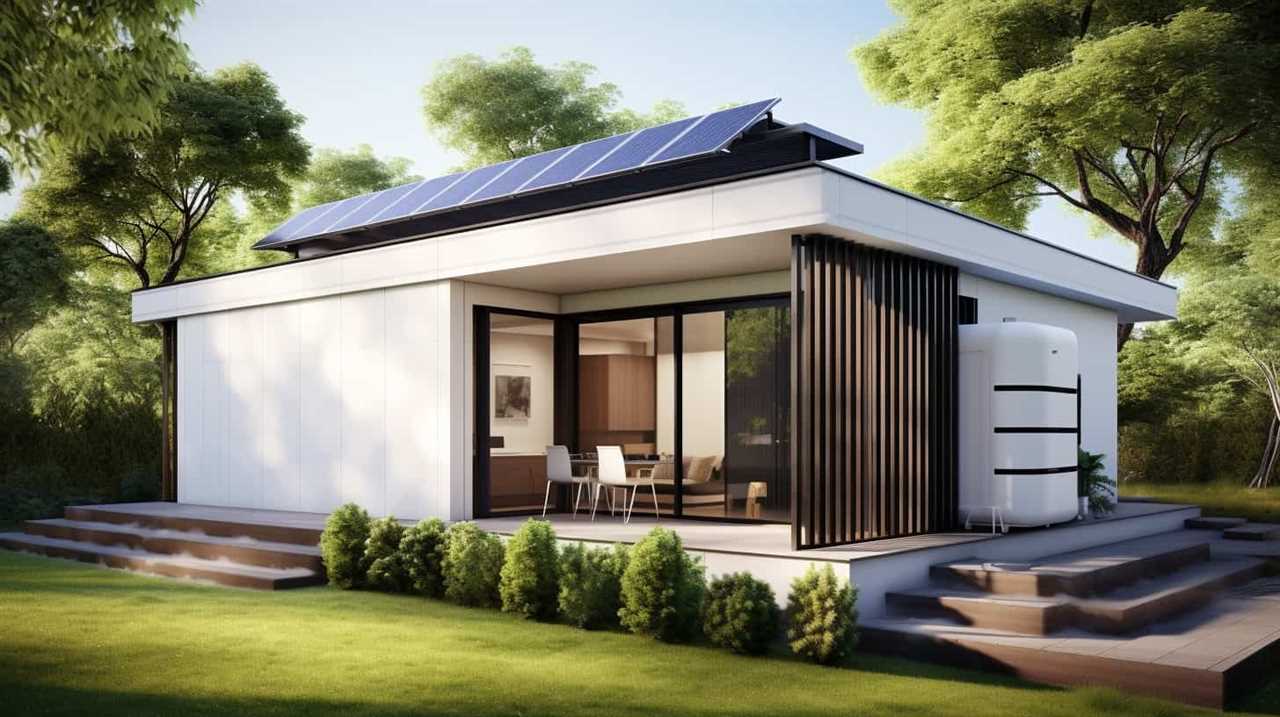
The heat pump refrigeration cycle consists of four main components: the compressor, condenser, expansion valve, and evaporator.
The cycle begins with the compressor, which increases the pressure and temperature of the refrigerant.
The high-pressure, high-temperature refrigerant then flows into the condenser, where it releases heat to the surroundings and condenses into a liquid.
The liquid refrigerant passes through the expansion valve, which reduces its pressure and temperature.
This low-pressure, low-temperature refrigerant then enters the evaporator, where it absorbs heat from the surrounding environment and evaporates into a gas.
The advantages of the heat pump refrigeration cycle include its ability to provide both heating and cooling, making it suitable for a wide range of applications such as residential and commercial buildings, as well as industrial processes.
Advancements in Heat Pump Compressor Technology
We have discovered exciting advancements in heat pump compressor technology. These advancements have brought significant benefits to the field of heat pump refrigeration cycles.
One major advancement is the development of variable speed compressors. These compressors can adjust their speed based on the cooling or heating demands, resulting in improved energy efficiency and reduced energy consumption.
Another advancement is the use of scroll compressors, which have a higher efficiency compared to traditional piston compressors. Scroll compressors also have fewer moving parts, reducing the risk of mechanical failure and increasing the overall lifespan of the compressor.
Additionally, advancements in compressor materials have led to improved durability and reliability, allowing for longer maintenance intervals and reduced operational costs.
These advancements in heat pump compressor technology are revolutionizing the industry, providing more efficient and reliable heating and cooling solutions.
Enhancements in Heat Pump Condenser Design
The latest advancements in heat pump condenser design have resulted in improved efficiency and performance. These enhancements have focused on the use of advanced heat pump condenser materials and condenser heat transfer techniques.
Here are some key features of the latest heat pump condenser designs:
Enhanced heat transfer surfaces: The condenser surfaces have been optimized to maximize heat transfer, allowing for improved heat exchange between the refrigerant and the surrounding air.
Microchannel technology: This design utilizes small channels to increase the surface area available for heat transfer, resulting in higher efficiency and reduced refrigerant charge.
Corrosion-resistant materials: The use of corrosion-resistant materials in condenser construction ensures long-lasting performance and minimizes maintenance requirements.

Variable speed fans: These fans can adjust their speed based on the heat load, providing better control and improved energy efficiency.
Compact design: The latest heat pump condensers are designed to be more compact, allowing for easier installation and reducing space requirements.
With these advancements in heat pump condenser design, we can now transition into discussing the innovations in heat pump evaporator technology.
Innovations in Heat Pump Evaporator Technology
As we delve into the topic of innovations in heat pump evaporator technology, it’s important to understand the latest advancements in this crucial component of the refrigeration cycle. Heat pump evaporator design plays a significant role in the overall performance and efficiency of a heat pump system. Recent developments in evaporator technology have focused on improving heat transfer efficiency and reducing energy consumption.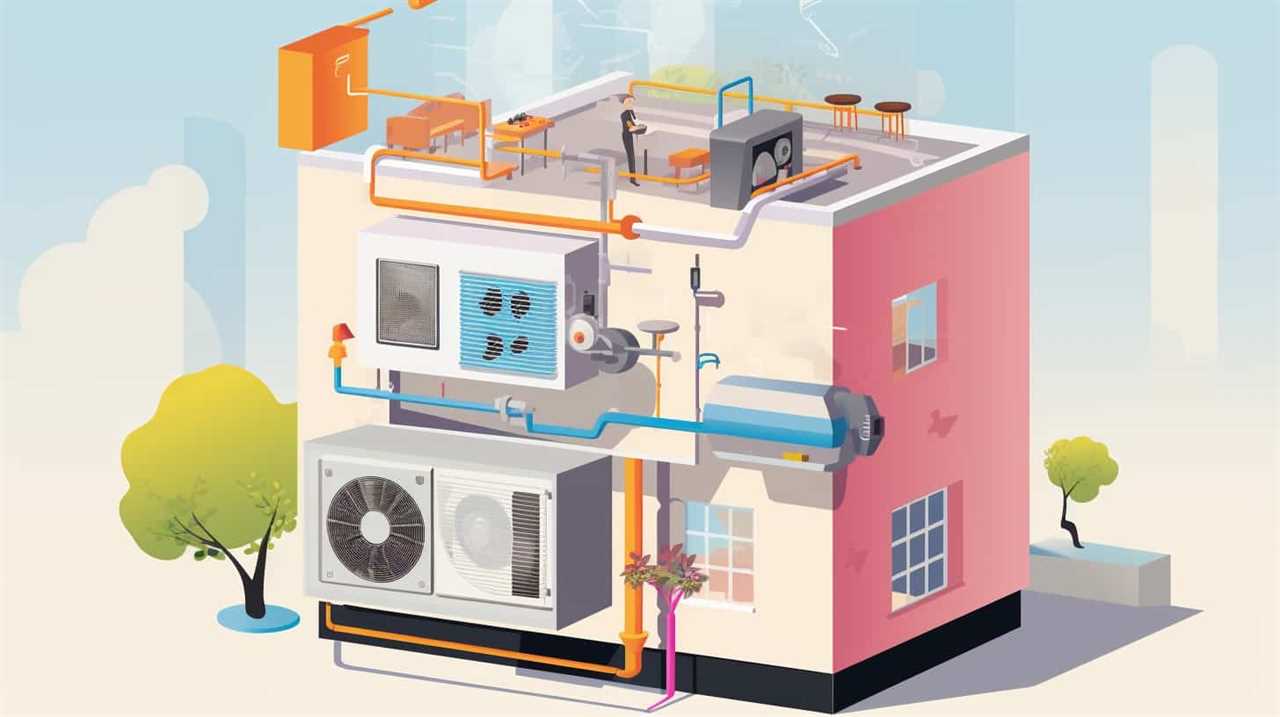
One key area of innovation is the enhancement of heat pump evaporator design to increase the surface area available for heat exchange. This can be achieved through the use of compact, high-performance coil designs or the incorporation of advanced materials with improved thermal conductivity. By maximizing the heat transfer surface area, evaporators can effectively extract heat from the surrounding environment and transfer it to the refrigerant.
Another focus of innovation is on evaporator performance improvements. Efforts have been made to optimize the refrigerant flow and distribution within the evaporator, ensuring uniform heat transfer across the entire surface. This helps to minimize temperature differences and improve overall system efficiency. Additionally, advancements in control systems and sensors allow for better monitoring and adjustment of evaporator performance, ensuring optimal operation under varying load conditions.
Upgrades in Heat Pump Expansion Valve Design
We will now discuss the upgrades in heat pump expansion valve design.
These upgrades aim to improve the efficiency of the heat pump system through expansion, enhance control over the refrigerant flow, and optimize overall performance.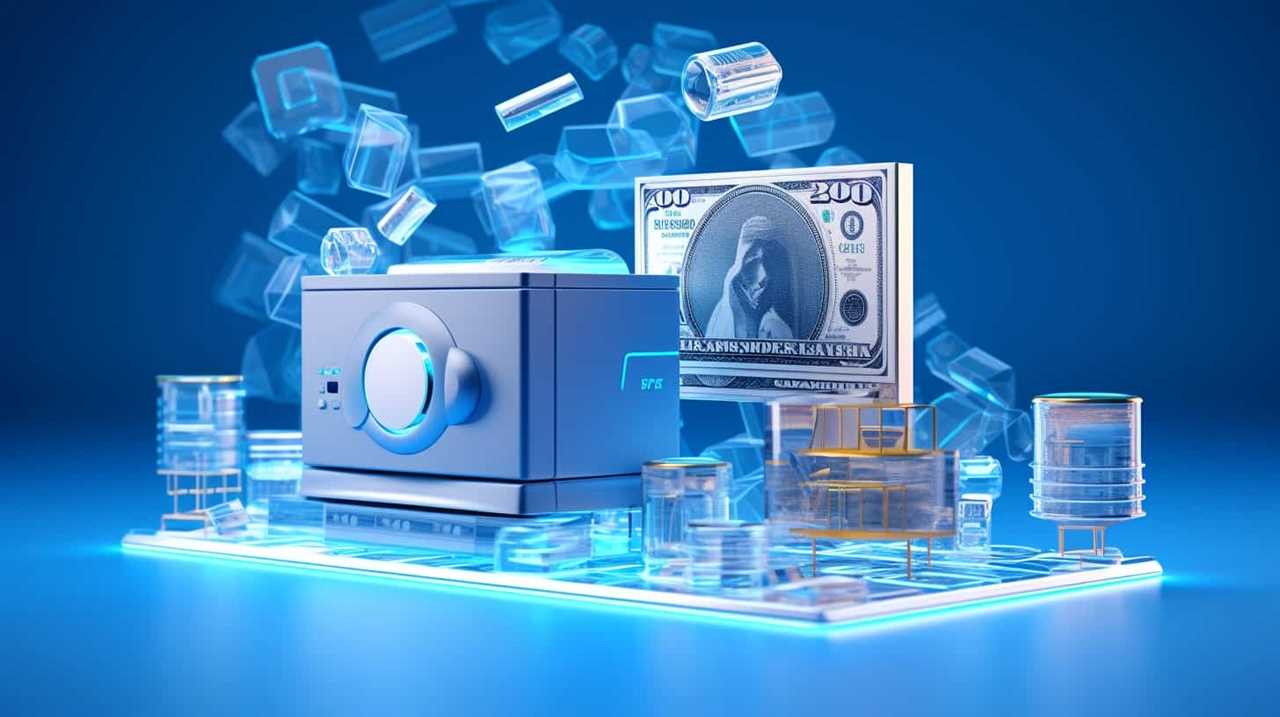
Improved Efficiency Through Expansion
Our research has identified three key upgrades in heat pump expansion valve design that have significantly improved efficiency. These upgrades focus on expansion efficiency and performance optimization.
Variable orifice design: The new expansion valves feature a variable orifice design, allowing for precise control of refrigerant flow based on system requirements. This improves overall system efficiency by reducing unnecessary refrigerant flow and minimizing energy consumption.
Improved sensing technology: The latest expansion valves incorporate advanced sensing technology, enabling them to accurately measure system conditions and adjust the refrigerant flow accordingly. This ensures optimal performance and efficiency under varying operating conditions.
Enhanced flow control: The upgraded expansion valves have enhanced flow control mechanisms, such as stepper motor actuators, which provide precise and immediate response to system demands. This results in improved system stability and efficiency.

Integrated temperature and pressure regulation: The new expansion valves integrate temperature and pressure regulation functions, allowing for better control and optimization of the refrigerant flow. This ensures optimal heat transfer and system efficiency.
Enhanced reliability and durability: The latest expansion valves are designed with high-quality materials and improved construction techniques, ensuring long-term reliability and durability. This reduces maintenance requirements and enhances the overall performance of the heat pump system.
Enhanced Control and Performance
Two significant upgrades in heat pump expansion valve design have been implemented to enhance control and performance.
The first upgrade focuses on improved temperature regulation. By incorporating advanced temperature sensors and control algorithms, the heat pump system can accurately monitor and adjust the flow of refrigerant through the expansion valve. This ensures that the desired temperature is maintained consistently, resulting in increased comfort and energy efficiency.
The second upgrade involves advanced system monitoring. With the integration of smart technology and data analytics, the heat pump system can continuously monitor various parameters such as pressure, temperature, and flow rate. This real-time monitoring allows for proactive detection of any potential issues or inefficiencies, enabling timely maintenance and optimization of the system’s performance.
These advancements in heat pump expansion valve design significantly contribute to enhanced control and performance, providing users with a more efficient and reliable heating and cooling solution.
Latest Trends in Heat Pump Refrigerant Selection
When considering the latest trends in heat pump refrigerant selection, three important points come to mind.
Firstly, the environmental impact of refrigerants is a crucial factor to consider, as certain refrigerants have a high global warming potential.
Secondly, energy efficiency improvements are a key consideration, as selecting a refrigerant with higher energy efficiency can lead to significant energy savings.
Lastly, emerging refrigerant technologies are being developed, such as low GWP (global warming potential) refrigerants and natural refrigerants, which offer promising alternatives to traditional refrigerants.
Environmental Impact of Refrigerants
What are the latest trends in heat pump refrigerant selection and their environmental impact?
Environmental regulations are pushing for the phase-out of refrigerants with high global warming potential (GWP).

Alternative refrigerants with lower GWP are being developed and adopted by manufacturers.
Natural refrigerants like hydrofluorocarbons (HFCs) and hydrochlorofluorocarbons (HCFCs) are being replaced by options like hydrofluoroolefins (HFOs) and hydrofluorocarbons (HFCs).
Low-GWP blends, such as HFO-1234ze and HFO-1234yf, are gaining popularity due to their reduced environmental impact.
Some heat pump systems are even exploring the use of carbon dioxide (CO2) as a refrigerant, which has a GWP of 1 and is considered environmentally friendly.

These trends in heat pump refrigerant selection reflect the industry’s commitment to reducing the environmental impact of refrigerants while still providing efficient and reliable cooling solutions. By embracing alternative refrigerants and complying with environmental regulations, manufacturers can contribute to a sustainable future.
Energy Efficiency Improvements
As we delve into the topic of energy efficiency improvements, let’s explore the latest trends in heat pump refrigerant selection.
In recent years, there’s been a growing emphasis on energy saving techniques and sustainable cooling solutions. One of the key trends in heat pump refrigerant selection is the shift towards low global warming potential (GWP) refrigerants. These refrigerants have a significantly lower environmental impact compared to traditional high GWP refrigerants, contributing to the overall sustainability of heat pump systems.
Additionally, there’s been a focus on selecting refrigerants with high thermodynamic efficiency, which helps to improve the overall energy efficiency of heat pump systems.
Emerging Refrigerant Technologies
Let’s explore the latest trends in heat pump refrigerant selection and uncover the emerging technologies in the field. As emerging refrigerant regulations continue to tighten, the focus is shifting towards selecting refrigerants with lower global warming potential (GWP) and higher energy efficiency.
Here are the top five emerging refrigerant technologies:
Hydrofluoroolefins (HFOs): These next-generation refrigerants have significantly lower GWP compared to traditional refrigerants.
Natural refrigerants: Substances like ammonia, carbon dioxide, and hydrocarbons have gained popularity due to their low environmental impact.

Blends: Refrigerant blends, such as HFC/HFO blends, provide a balance between performance and environmental impact.
Zeotropic refrigerants: These mixtures have different boiling points, allowing for better heat transfer and efficiency.
Azeotropic refrigerants: These refrigerants have a constant boiling point, ensuring stable performance throughout the cycle.
With emerging refrigerant technologies, we can reduce the impact on global warming while improving heat pump system efficiency.
Now, let’s dive into the next section about improvements in heat pump system efficiency.
Improvements in Heat Pump System Efficiency
We have achieved significant improvements in heat pump system efficiency through the implementation of advanced technologies. These advancements haven’t only increased the cost effectiveness of heat pump systems but also enhanced their durability.
One major improvement is the use of variable speed compressors, which allow the system to adjust its capacity based on the heating or cooling demands. This reduces energy consumption and improves overall efficiency.
Additionally, the integration of advanced controls and algorithms has optimized the system’s performance and minimized energy waste.
Furthermore, advancements in heat exchanger technology have led to increased heat transfer efficiency, resulting in improved system performance.
These improvements in efficiency have made heat pump systems more reliable and cost-effective, providing greater value to homeowners and businesses.
With these advancements, we can now transition into discussing breakthroughs in heat pump defrosting techniques.
Breakthroughs in Heat Pump Defrosting Techniques
We have made significant progress in improving heat pump defrosting techniques, resulting in enhanced defrosting efficiency and energy conservation.

Our latest breakthroughs have focused on developing advanced algorithms and sensors that accurately detect frost build-up and initiate the defrost cycle at the optimal time.
Additionally, we’ve integrated innovative heat transfer technologies that effectively remove frost from the heat exchanger surfaces, minimizing energy consumption and maximizing system performance.
Improved Defrosting Efficiency
With the latest breakthroughs in heat pump defrosting techniques, we can now achieve improved efficiency in the defrosting process. This is crucial for ensuring the seamless operation of heat pumps and maximizing their performance.
Here are some efficient defrosting techniques and defrosting cycle optimization methods that have emerged:
Hot gas defrosting: Utilizing the heat from the refrigerant to melt ice buildup on the heat exchanger coils.
Reverse cycle defrosting: Reversing the refrigerant flow to warm up the outdoor coil and remove frost accumulation.
Intelligent defrost control: Implementing advanced algorithms to optimize the timing and duration of defrost cycles based on real-time conditions.
Frost detection sensors: Installing sensors to detect frost buildup and trigger the defrosting process when necessary.

Enhanced coil design: Incorporating innovative coil designs that minimize frost formation and facilitate quicker defrosting.
By implementing these techniques, heat pump systems can effectively and efficiently manage defrosting, leading to improved performance and enhanced energy conservation.
Now, let’s delve into the next section to explore how these advancements contribute to enhanced energy conservation.
Enhanced Energy Conservation
Through advancements in heat pump defrosting techniques, we can now achieve enhanced energy conservation by optimizing the defrosting process. By implementing improved insulation techniques and smart thermostat integration, heat pumps can operate more efficiently and reduce energy consumption.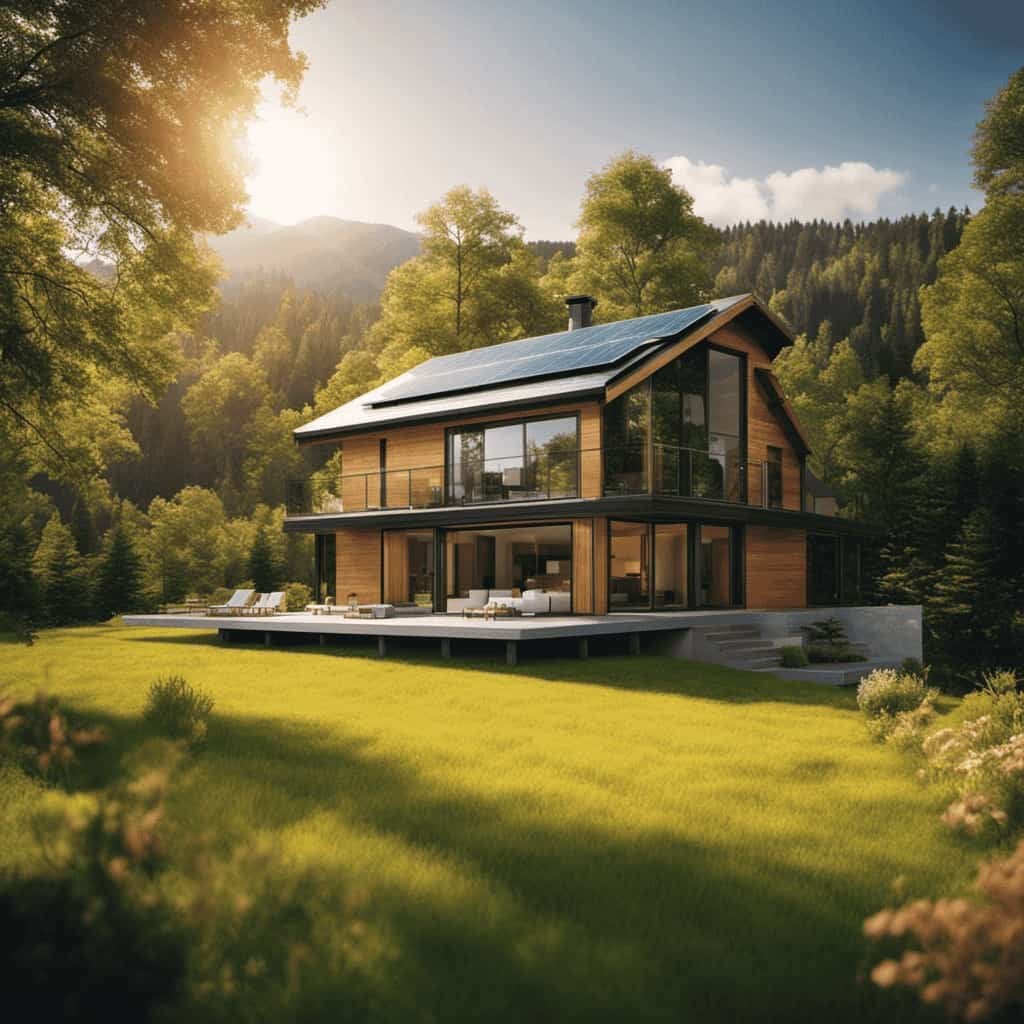
To illustrate the impact of these advancements, let’s consider the following table:
| Traditional Defrosting | Enhanced Defrosting | |
|---|---|---|
| Energy Consumption | High | Low |
| Efficiency | Low | High |
| Heating Capacity | Reduced | Maintained |
| Operating Costs | High | Low |
| Environmental Impact | High | Low |
As shown in the table, enhanced defrosting techniques result in lower energy consumption, increased efficiency, maintained heating capacity, reduced operating costs, and a lower environmental impact.
With these breakthroughs in energy conservation, we can now transition to discussing new developments in heat pump control systems.
New Developments in Heat Pump Control Systems
Our research has identified several significant advancements in heat pump control systems. These developments aim to improve the efficiency and performance of heat pumps by incorporating improved control algorithms and smart thermostat integration.
Here are some key updates in this field:
Enhanced control algorithms: New algorithms have been developed to optimize the operation of heat pumps, allowing for better regulation of temperature and energy consumption.
Smart thermostat integration: Heat pumps can now be integrated with smart thermostats, enabling users to remotely control and monitor their systems through mobile applications or voice commands.
Adaptive defrost technology: Heat pumps now employ adaptive defrost cycles, which intelligently regulate the defrosting process based on real-time weather conditions and system performance.

Fault detection and diagnostics: Advanced control systems can now detect and diagnose faults in heat pumps, allowing for timely maintenance and troubleshooting.
Energy management systems: Heat pump control systems can now be integrated with energy management systems, allowing users to optimize energy usage and reduce overall energy consumption.
These advancements in heat pump control systems not only enhance the performance and efficiency of heat pumps but also provide users with greater convenience and control over their heating and cooling systems.
Advances in Heat Pump Heat Recovery Technology
As we delve into the topic of advances in heat pump heat recovery technology, it is important to highlight the recent developments that have revolutionized the efficiency and effectiveness of heat recovery systems. One significant advancement is the utilization of heat pump waste heat for various heat recovery applications. This innovative approach allows for the capture and reuse of heat that would otherwise be wasted, resulting in improved energy efficiency and cost savings.
To illustrate the potential of heat pump heat recovery technology, let’s consider the following table:
| Heat Recovery Application | Description |
|---|---|
| Space Heating | The recovered heat can be used to warm up indoor spaces, reducing the need for traditional heating systems. |
| Water Heating | The captured heat can be used to heat water for domestic or commercial use, reducing the energy consumption associated with water heating. |
| Industrial Processes | The waste heat can be utilized in various industrial processes, such as drying, preheating, or generating steam, optimizing energy usage and reducing operational costs. |
| District Heating | The recovered heat can be distributed to multiple buildings or areas, providing a more efficient and sustainable heating solution for communities. |
These advancements in heat pump heat recovery technology not only contribute to environmental sustainability but also offer significant benefits to end-users by reducing energy consumption and operating costs. By harnessing the potential of heat pump waste heat, we can maximize the efficiency of heat recovery systems and serve the needs of a greener, more sustainable future.
Future Outlook for Heat Pump Refrigeration Cycle
Let’s explore the potential advancements and trends that lie ahead for the heat pump refrigeration cycle.
The future outlook for the heat pump refrigeration cycle shows promising growth in the market. However, there are several challenges that need to be addressed in order to fully implement this technology.
Here are some key points to consider:
Increased market demand: The heat pump refrigeration cycle market is expected to experience significant growth in the coming years. This is driven by the increasing need for more energy-efficient and environmentally friendly refrigeration solutions.
Technological advancements: Advancements in heat pump technology, such as the use of advanced materials and improved system designs, will enhance the performance and efficiency of the refrigeration cycle.
Integration with renewable energy sources: The heat pump refrigeration cycle can be integrated with renewable energy sources, such as solar and geothermal energy, to further reduce carbon emissions and reliance on fossil fuels.

Cost-effective solutions: As the technology continues to advance, the cost of implementing heat pump refrigeration systems is expected to decrease, making it a more viable option for businesses and consumers.
Regulatory support: Governments and regulatory bodies are increasingly recognizing the importance of energy-efficient and sustainable technologies. This support will drive the adoption of heat pump refrigeration systems and create a favorable market environment.
The future of the heat pump refrigeration cycle looks promising, with significant market growth expected. However, challenges in implementing this technology, such as cost and integration with renewable energy sources, need to be addressed to fully capitalize on its potential.
Frequently Asked Questions
How Does the Heat Pump Refrigeration Cycle Work?
The heat pump refrigeration cycle works by utilizing the principles of heat transfer to move heat from a lower temperature source to a higher temperature sink. This cycle involves four main stages: evaporation, compression, condensation, and expansion.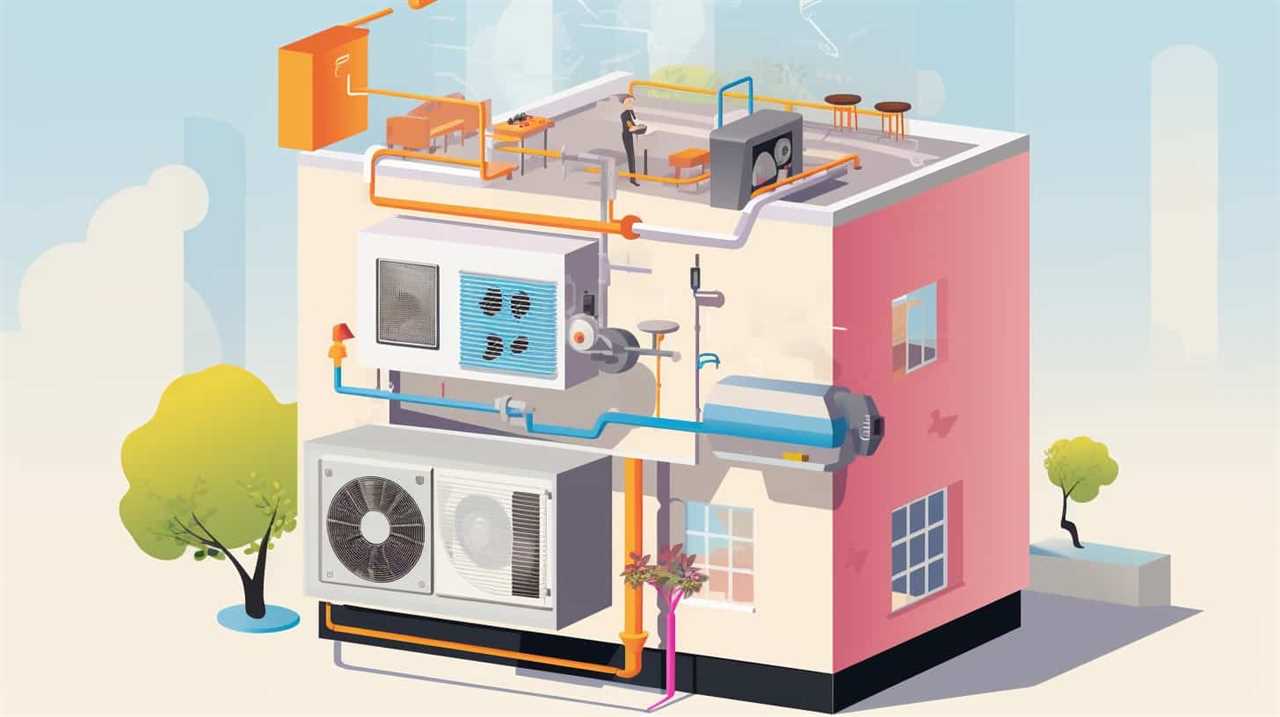
What Are the Benefits of Using Heat Pump Compressor Technology Advancements?
Using the latest advancements in heat pump compressor technology, we can achieve smart controls and significant energy savings. These advancements allow for precise and detailed control, serving our audience’s desire for efficiency and cost-effective solutions.
How Do Enhancements in Heat Pump Condenser Design Contribute to Overall System Performance?
Enhancements in heat pump condenser design, including the use of advanced materials and optimizing condenser size, greatly contribute to the overall performance of the system. These improvements result in increased efficiency and improved cooling capacity.
What Are the Innovations in Heat Pump Evaporator Technology and How Do They Improve Efficiency?
Advancements in heat pump evaporator design have significantly improved heat pump evaporator efficiency. These innovations optimize heat transfer, increase surface area, and enhance airflow, resulting in higher system efficiency and improved overall performance.
What Are the Latest Trends in Heat Pump Refrigerant Selection and How Do They Impact the Environment?
Heat pump refrigerant alternatives are the latest trends in the industry. They have a significant impact on the environment. We explore their environmental impact in this discussion on heat pump refrigeration cycle advancements.
What Are the Latest Technological Updates in the Heat Pump Refrigeration Cycle?
The chilled magic of heat pump refrigeration continues to evolve with the latest technological updates in the field. From improved efficiency to advanced control systems, these updates aim to enhance performance while reducing energy consumption. Innovations such as variable-speed compressors, intelligent defrosting algorithms, and advanced refrigerants are pushing the boundaries of heat pump technology, enabling more sustainable and environmentally friendly cooling solutions. Stay tuned for the exciting developments in the heat pump refrigeration cycle.
Conclusion
In conclusion, the latest tech updates in the heat pump refrigeration cycle have brought about significant advancements in:
- Compressor technology
- Condenser design
- Evaporator technology
- Expansion valve design
- Defrosting techniques
- Control systems
- Heat recovery technology
These developments have propelled the heat pump refrigeration cycle into a new era of efficiency and performance. Just like a well-oiled machine, the heat pump refrigeration cycle now operates seamlessly, delivering optimal cooling and heating while reducing energy consumption.
Installation and Maintenance of Heat Pumps
Unmasking Myths: Heat Pumps Versus Traditional Heaters

Dear audience, it is now the moment to reveal the reality. In the ongoing debate between heat pumps and traditional heaters, there have been numerous false beliefs and misunderstandings circulating.
But fear not, for today we will dismantle the falsehoods and reveal the facts. Join us as we delve into the world of energy efficiency, cost comparison, environmental impact, and the performance of heat pumps.
Prepare to be enlightened and empowered as we uncover the true potential and long-term savings of heat pump technology.
Key Takeaways
- Heat pumps are more energy efficient than traditional heaters, producing up to three units of heat per unit of electricity consumed.
- Heat pumps have a lower carbon footprint and contribute to reducing greenhouse gas emissions compared to traditional heaters.
- Heat pumps offer long-term savings due to lower installation expenses, lower energy bills, and reduced maintenance costs.
- Heat pumps are reliable, durable, and provide consistent heating and cooling performance throughout the year.
Energy Efficiency: Understanding the Numbers
Let’s delve into the numbers and understand the energy efficiency of heat pumps compared to traditional heaters.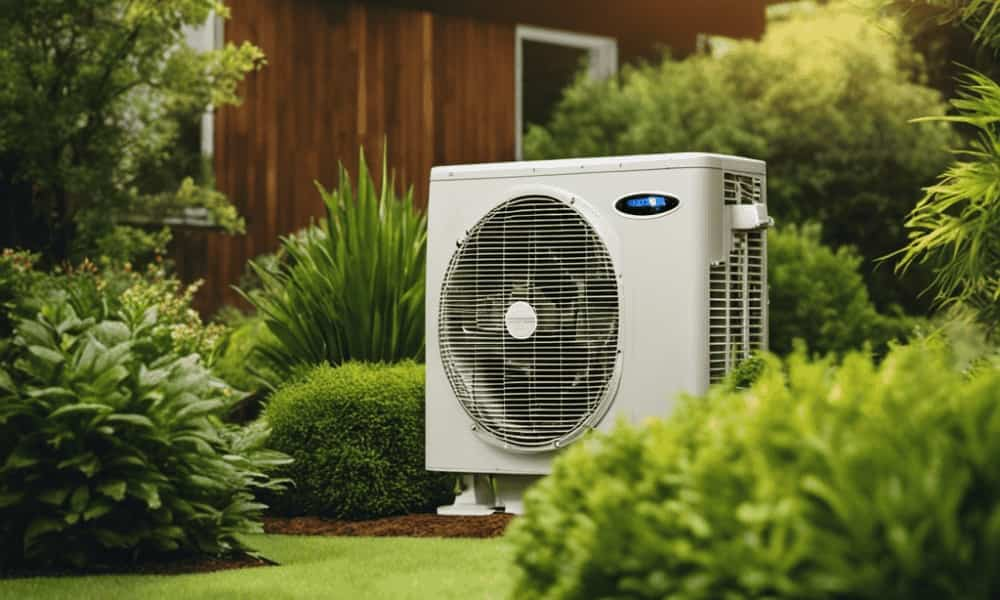
When it comes to energy savings, heat pumps have a clear advantage. They’re able to transfer heat from the air or ground, rather than generating heat directly. This means that for every unit of electricity consumed, heat pumps can produce up to three units of heat.
On the other hand, traditional heaters, such as furnaces, burn fuel to create heat, resulting in lower energy efficiency.
Additionally, heat pumps have a lower carbon footprint compared to traditional heaters. Since they rely on renewable energy sources, such as air or ground heat, they release fewer greenhouse gas emissions.
Cost Comparison: Heat Pumps Vs. Traditional Heaters
When comparing costs, heat pumps offer significant savings compared to traditional heaters. This is due to lower installation expenses and maintenance costs associated with heat pumps.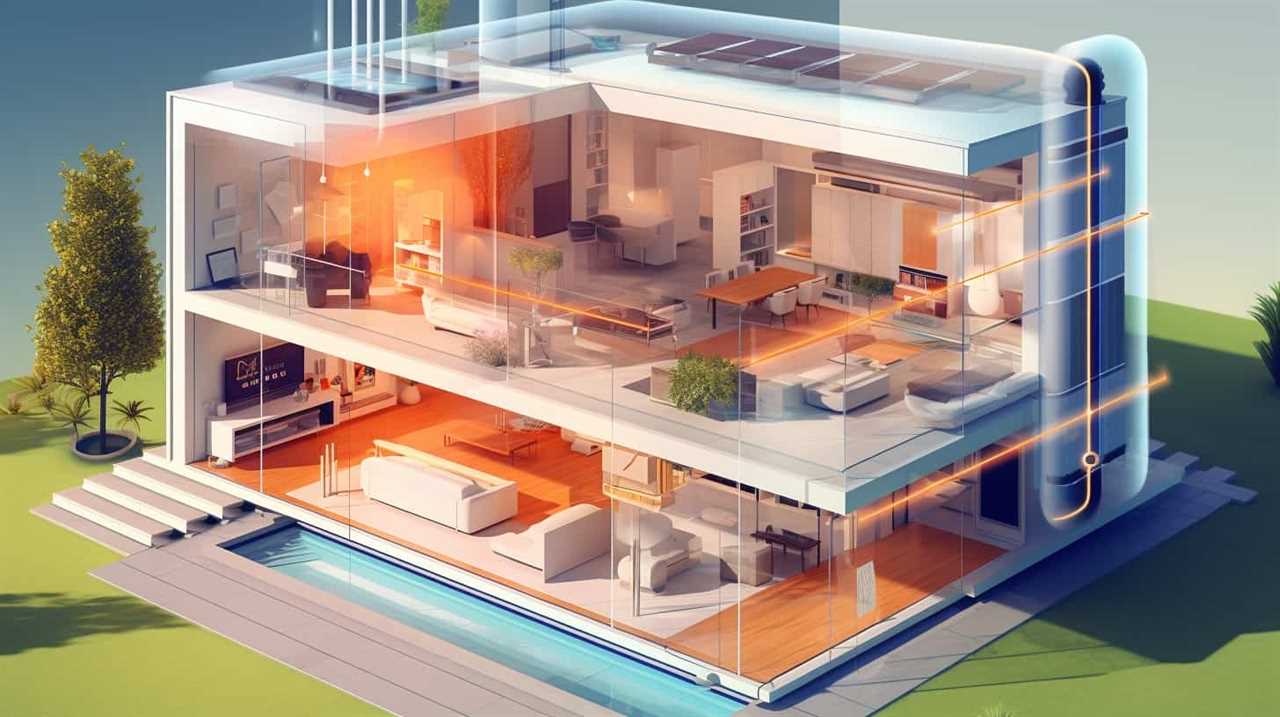
Here are three reasons why heat pumps are more cost-effective:
-
Lower installation expenses: Heat pumps require only one installation, as they serve both heating and cooling purposes. This eliminates the need for separate systems, saving you money on installation costs.
-
Reduced maintenance costs: Heat pumps have fewer moving parts compared to traditional heaters, resulting in lower maintenance needs and costs over time. This translates into long-term savings for homeowners.
-
Energy efficiency: Heat pumps are highly efficient, using less energy to produce the same amount of heat as traditional heaters. This means lower energy bills and more money in your pocket.
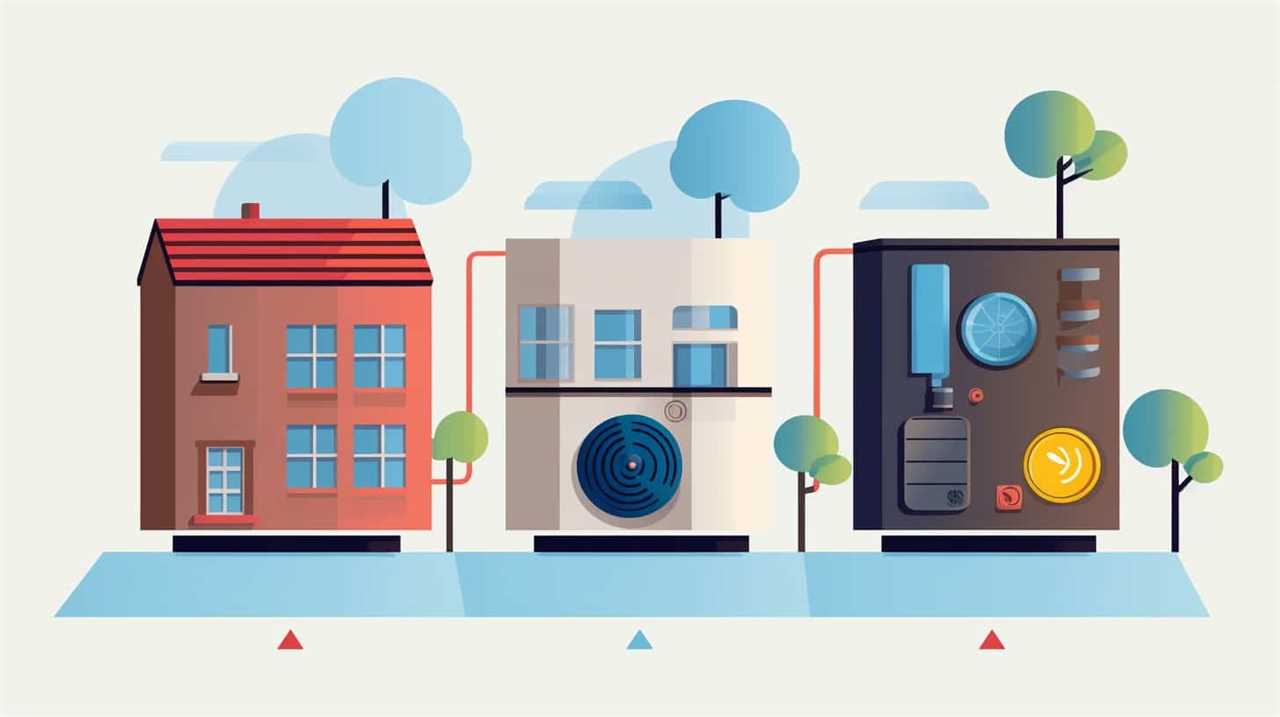
Environmental Impact: Assessing Electricity Usage
When considering the environmental impact of heat pumps versus traditional heaters, we need to assess their electricity usage.
Heat pumps are known for their energy efficiency, utilizing electricity to transfer heat rather than generating it. This results in lower electricity consumption compared to traditional heaters that rely on combustion.
By reducing the amount of electricity needed to heat a space, heat pumps contribute to a lower carbon footprint. The carbon footprint is a measure of the greenhouse gas emissions produced during the entire lifecycle of a product or service.
Since heat pumps have lower electricity consumption, they indirectly reduce the carbon emissions associated with electricity generation. This makes heat pumps a greener and more environmentally friendly option for heating homes and buildings.
Heat Pump Performance: Debunking the Myths
We’ve tested and debunked the myths surrounding heat pump performance. Contrary to popular belief, heat pumps are reliable and offer efficient heating and cooling solutions. Here’s what you need to know:
-
Heat Pump Reliability: Heat pumps are designed to last for many years, providing consistent performance with proper maintenance. They’re built with durable components that can withstand various weather conditions.
-
Efficient Installation: Heat pump installation is a straightforward process that can be completed by professionals in a timely manner. It involves connecting the indoor and outdoor units, as well as installing the necessary ductwork. With proper installation, heat pumps can efficiently heat or cool your space.
-
Consistent Performance: Heat pumps offer consistent heating and cooling throughout the year. They’re designed to maintain a comfortable indoor environment, regardless of the outdoor temperature. With advanced technology and smart controls, heat pumps can adapt to changing weather conditions and provide consistent performance.
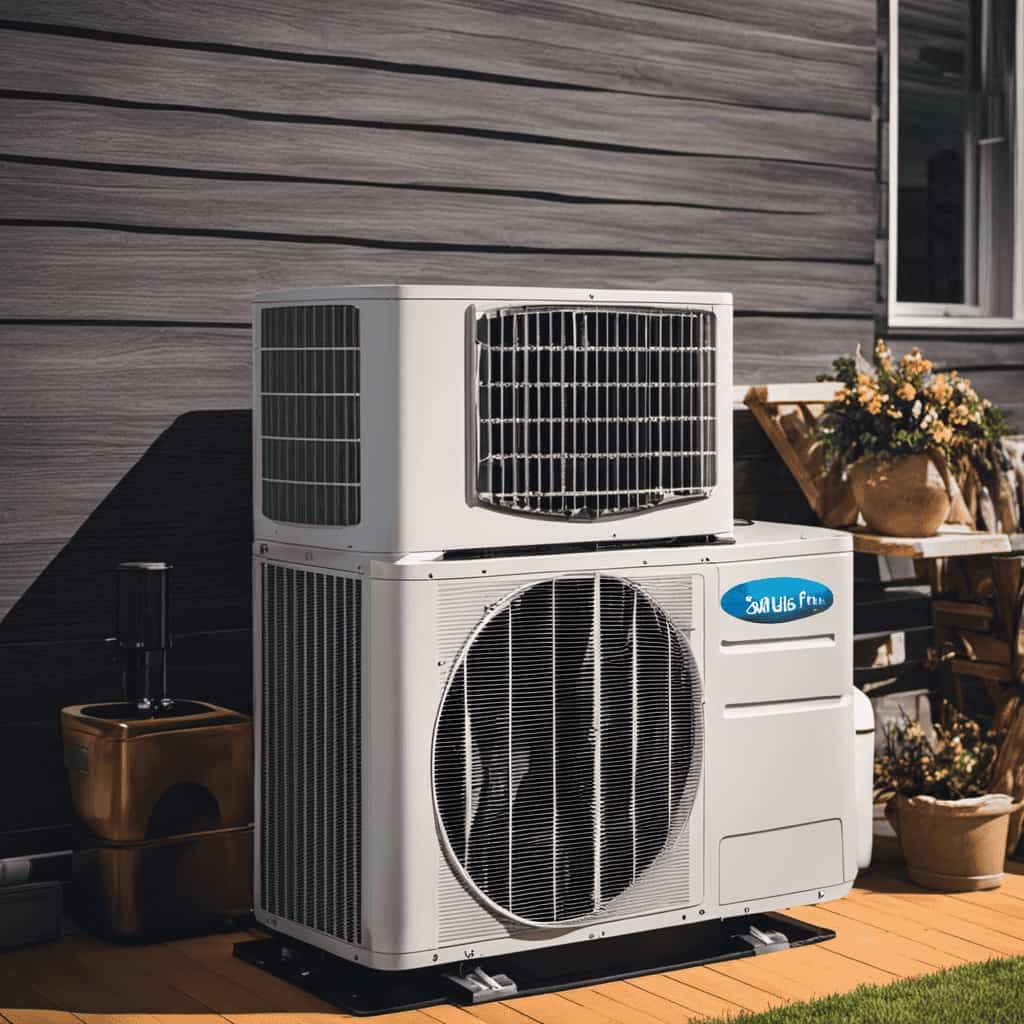
Long-Term Savings: Investing in Heat Pump Technology
Investing in heat pump technology can provide long-term savings for homeowners. Heat pumps are highly efficient systems that use electricity to transfer heat from one place to another. Unlike traditional heaters, which rely on burning fuel to generate heat, heat pumps use the ambient air or ground as a heat source. This means that they can provide heating and cooling for your home, making them a versatile option.
The long-term benefits of heat pumps include lower energy bills, reduced maintenance costs, and a smaller carbon footprint. While the initial investment may be higher than traditional heaters, the return on investment is significant over time. Homeowners can expect to see a decrease in their energy consumption and enjoy a more comfortable living environment.
Frequently Asked Questions
Are There Any Government Incentives or Rebates Available for Installing a Heat Pump?
Yes, there are government incentives and rebates available for installing a heat pump. These incentives are aimed at promoting energy savings and reducing carbon emissions. They vary depending on location and can help offset the cost of installation.
How Noisy Are Heat Pumps Compared to Traditional Heaters?
Heat pumps are quieter than traditional heaters, making them a more peaceful option for your home. Additionally, their efficiency can save you money on energy bills, giving you the freedom to spend your hard-earned cash elsewhere.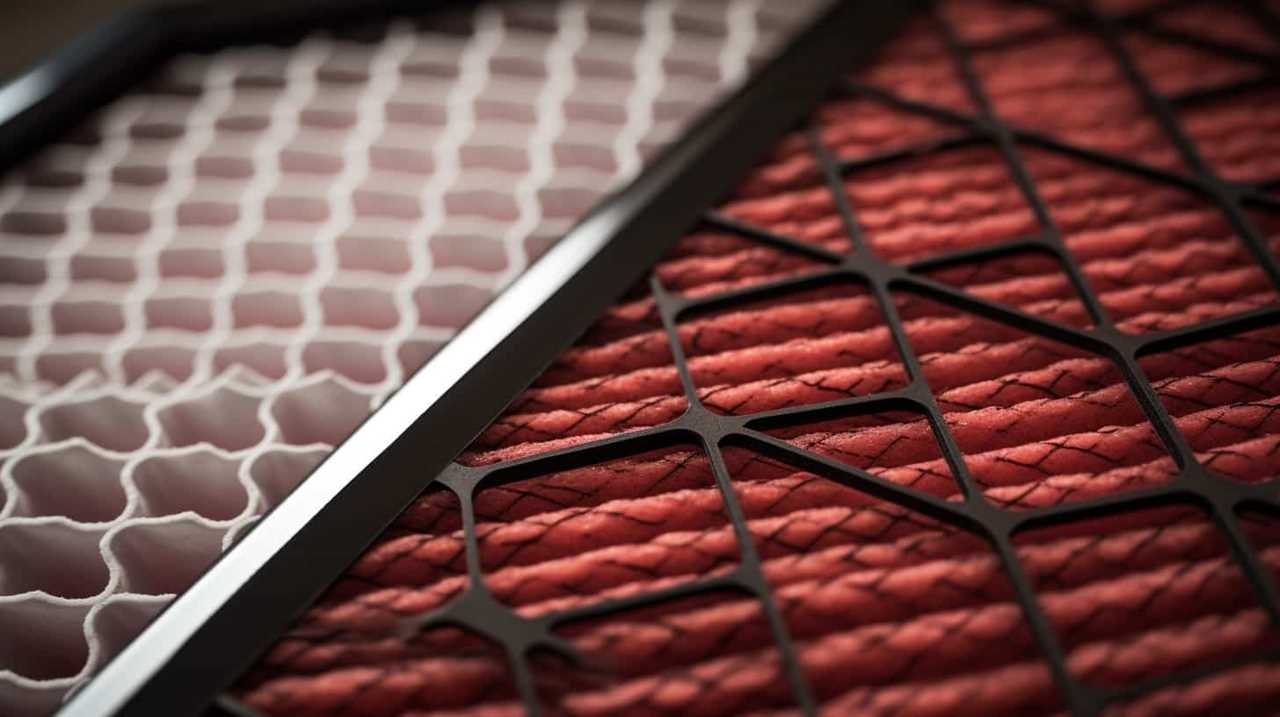
Can a Heat Pump Be Used for Both Heating and Cooling Purposes?
Yes, a heat pump can be used for both heating and cooling purposes. It is highly efficient and offers numerous benefits like energy savings, year-round comfort, and eco-friendliness.
What Is the Average Lifespan of a Heat Pump?
Heat pumps offer efficient heating and cooling, making them a versatile choice. The average lifespan of a heat pump can vary depending on maintenance, but with regular care, they can last 15-20 years. Regular maintenance increases their longevity and ensures optimal performance.
Are Heat Pumps Suitable for All Types of Homes and Climates?
Heat pumps are suitable for most homes and climates, but efficiency may vary. They can efficiently heat and cool, saving on energy costs. Installation costs can be high, but long-term savings can outweigh initial expenses.
Conclusion
In conclusion, heat pumps offer a more energy-efficient and cost-effective heating solution compared to traditional heaters.

One interesting statistic to consider is that heat pumps can save up to 50% on energy costs compared to traditional heaters, leading to significant long-term savings.
By choosing heat pump technology, not only can we reduce our environmental impact, but we can also enjoy the benefits of lower utility bills.
It’s time to debunk the myths and embrace the efficiency of heat pumps.
Installation and Maintenance of Heat Pumps
Boost Your Heat Pump Efficiency With Green Energy

Are you seeking to optimize your heat pump’s effectiveness while lessening your environmental impact? Look no more!
In this article, we’ll show you how to boost your heat pump’s performance with the power of green energy. Imagine harnessing the sun’s rays or the wind’s power to heat and cool your home effectively.
We’ll explore renewable energy sources such as solar, wind, and geothermal, and provide practical tips on incorporating these solutions into your heat pump system.
Get ready to master energy-efficient heating and cooling!
Key Takeaways
- Green energy, such as solar and wind power, can significantly increase heat pump energy efficiency and reduce carbon footprint.
- Solar thermal systems and biomass heating are sustainable and environmentally friendly options for powering heat pumps.
- Incorporating solar power and wind energy into heat pump systems through photovoltaic panels and wind turbines can optimize energy utilization and reduce reliance on the grid.
- Geothermal heat pumps provide a cost-effective and energy-independent solution with high efficiency, long lifespan, and reduced reliance on fossil fuels.
The Benefits of Green Energy for Heat Pump Efficiency
We can maximize our heat pump efficiency by harnessing the benefits of green energy. Green energy refers to renewable energy sources that have a minimal impact on the environment. By using green energy to power our heat pumps, we can significantly increase their energy efficiency while reducing our carbon footprint.
One of the key benefits of green energy is its ability to reduce greenhouse gas emissions, as it produces little to no carbon dioxide during generation. This not only helps to combat climate change but also improves the overall sustainability of our energy consumption.
Additionally, green energy sources such as solar and wind power are abundant and readily available, making them a reliable and cost-effective option for powering our heat pumps.
Exploring Renewable Energy Sources for Heat Pumps
To optimize our heat pump efficiency, let’s explore renewable energy sources and how they can be used to power our heat pumps. Renewable energy sources provide a sustainable and environmentally friendly solution for heating our homes.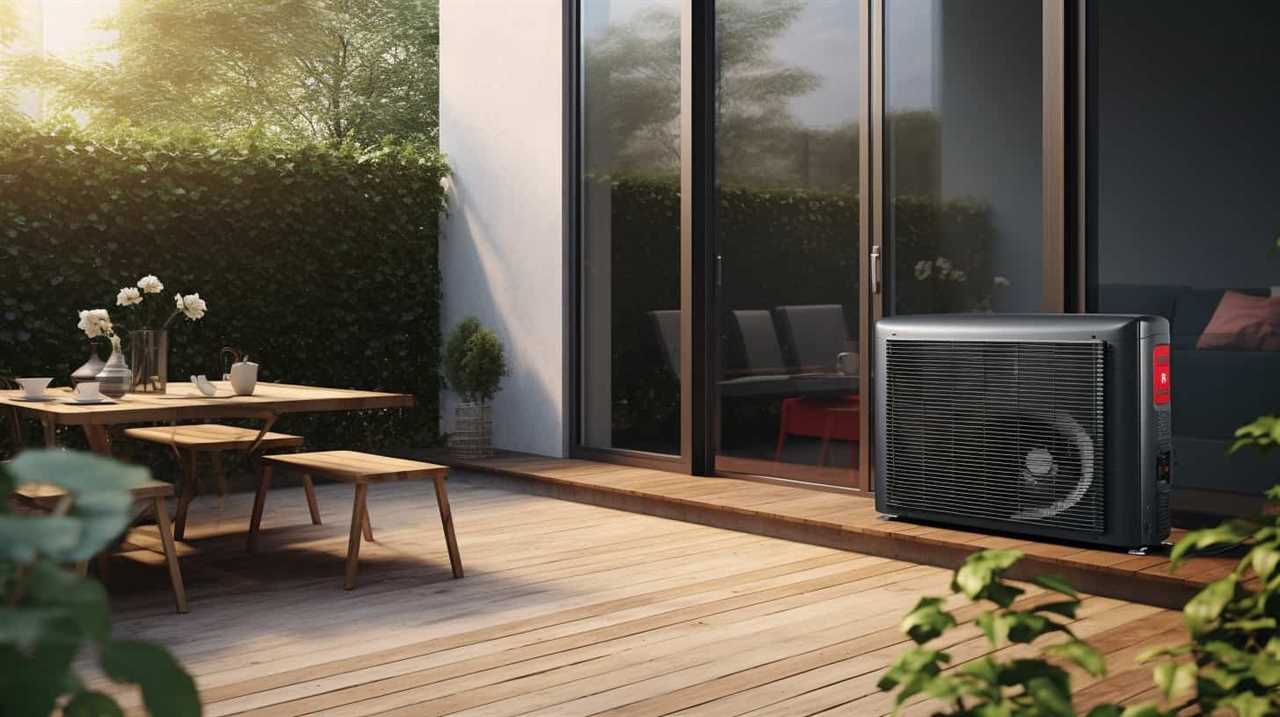
Two renewable energy sources that can be harnessed for heat pump operation are solar thermal and biomass heating.
Solar Thermal:
Solar thermal systems use the energy from the sun to heat water or a heat transfer fluid.
This heated fluid can then be used to power a heat pump, increasing its efficiency.
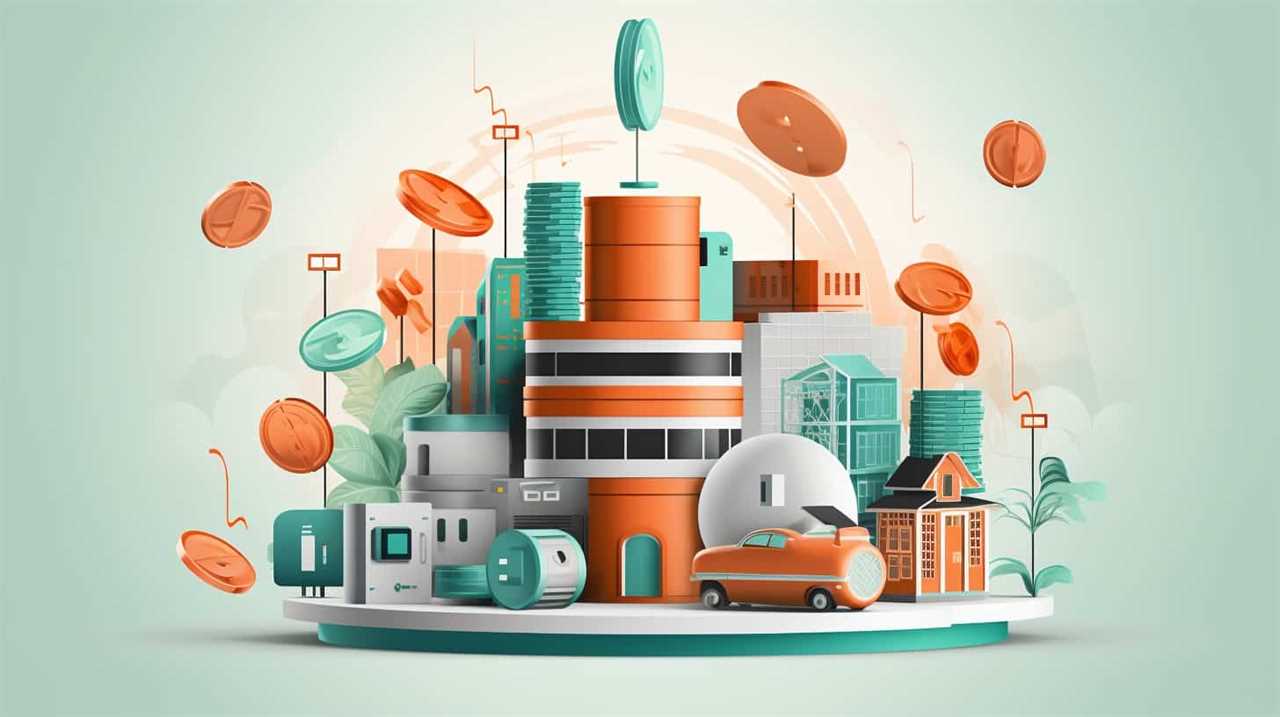
By utilizing solar thermal energy, we can reduce our dependence on traditional electricity sources and lower our carbon footprint.
Biomass Heating:
Biomass heating involves burning organic materials, such as wood pellets or agricultural waste, to produce heat.
This heat can then be used to power a heat pump, providing a renewable and sustainable energy source.

Biomass heating not only reduces greenhouse gas emissions but also supports local economies by utilizing locally sourced biomass materials.
How to Incorporate Solar Power Into Your Heat Pump System
By regularly utilizing solar power in conjunction with our heat pump system, we can significantly increase its efficiency.
One effective way to incorporate solar power into our heat pump system is by integrating photovoltaic panels. These panels convert sunlight into electricity, which can then be used to power the heat pump.
When installing the panels, it’s important to consider their placement and orientation for optimizing solar output. Placing them in a location with maximum sunlight exposure and angling them towards the sun can ensure that they generate the most electricity.

Additionally, it’s beneficial to connect the panels to a battery storage system, allowing any excess energy generated during the day to be stored and used during times when the sun isn’t shining.
Harnessing Wind Energy to Boost Heat Pump Performance
With the right equipment and strategic placement, we can effectively harness wind energy and use it to enhance the performance of our heat pump system. By installing wind turbines near our heat pump, we can tap into the power of the wind and convert it into electricity that can be used to run the heat pump.
Here are two ways to integrate wind energy into our heat pump system:
Utilize a wind turbine installation: Install a wind turbine close to our heat pump system to capture the maximum amount of wind energy. This will allow us to generate electricity that can power the heat pump, reducing our reliance on the grid and lowering our carbon footprint.

Combine wind and solar power: By combining wind and solar power, we can create a hybrid system that maximizes the use of renewable energy. During periods of low wind or at night, the solar panels can continue to provide electricity to the heat pump, ensuring uninterrupted operation.
Geothermal Energy: A Sustainable Solution for Heat Pump Efficiency
When it comes to improving the efficiency of our heat pump system, geothermal energy offers a sustainable solution. Geothermal heat pumps utilize the Earth’s natural heat to provide heating, cooling, and hot water for residential and commercial buildings. This technology relies on the fact that the temperature below the Earth’s surface remains relatively constant throughout the year.
By harnessing this stable heat source, geothermal heat pumps can achieve higher energy efficiency compared to traditional heating and cooling systems. The efficiency of geothermal heat pumps is measured by their coefficient of performance (COP), which represents the ratio of heat output to the amount of energy input. Typically, geothermal heat pumps have a COP of 3 to 4, meaning they produce three to four units of heat for every unit of electricity consumed.
This high efficiency is achieved by transferring heat to and from the ground, which requires less energy compared to systems that generate heat or cool air. In addition to being highly efficient, geothermal heat pumps also have a long lifespan and require minimal maintenance.
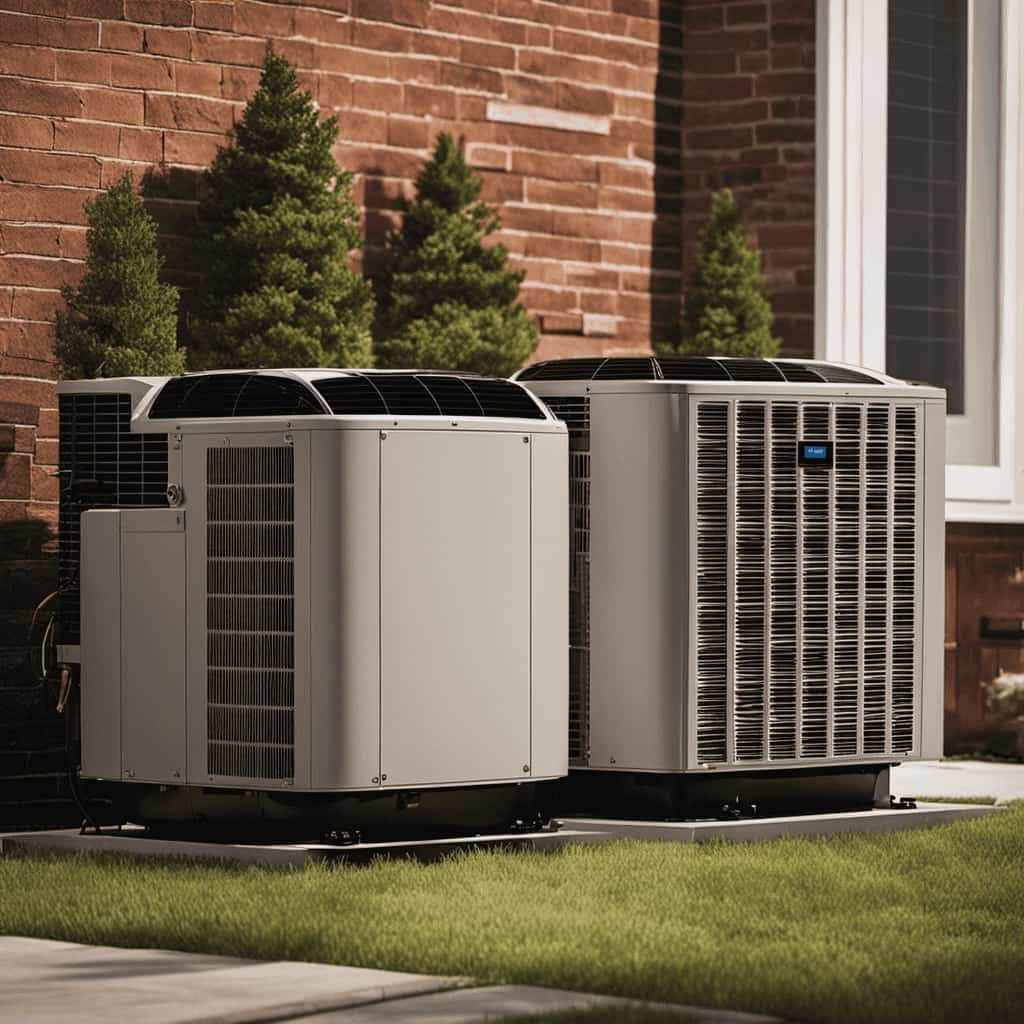
Frequently Asked Questions
What Is the Average Cost of Installing a Heat Pump System That Incorporates Solar Power?
The average cost of installing a heat pump system that incorporates solar power depends on various factors, such as the size of the system and any additional equipment required. The installation process involves connecting the solar panels to the heat pump and ensuring proper integration for maximum efficiency.
Are There Any Government Incentives or Tax Credits Available for Homeowners Who Invest in Renewable Energy Sources for Their Heat Pump Systems?
Yes, there are government incentives and tax credits available for homeowners who invest in renewable energy sources for their heat pump systems. These incentives and credits help boost efficiency and make green energy more affordable.
Can Wind Energy Be Harnessed Effectively in All Geographical Locations to Boost Heat Pump Performance?
Wind energy limitations and solar power efficiency vary based on geographical location. It’s important to assess the potential for harnessing wind energy effectively to boost heat pump performance.
How Does Geothermal Energy Compare to Other Renewable Energy Sources in Terms of Cost and Efficiency for Heat Pump Systems?
Geothermal energy comparison to other renewable sources for heat pump efficiency is important. Cost and efficiency vary depending on factors like location and system design. Understanding these differences can help optimize energy savings.
Are There Any Potential Drawbacks or Limitations to Using Green Energy Sources in Conjunction With Heat Pump Systems?
There can be potential drawbacks and limitations to integrating green energy sources with heat pump systems. It is important to consider the challenges and disadvantages in order to optimize the benefits and advantages.
How Can Green Energy Practices Improve the Refrigeration Cycle of a Heat Pump?
Green energy practices play a vital role in the heat pump efficiency optimization for refrigeration cycles. By integrating renewable energy sources like solar or geothermal, the heat pump can utilize clean energy to power its operation, reducing carbon emissions. This not only enhances the environmental impact but also improves the overall efficiency of the system. Implementing green energy practices enables heat pumps to operate at higher efficiencies, providing cost savings and contributing to a sustainable future.
How Can Green Energy Increase the Efficiency of Heat Pump HVAC Systems?
Green energy can significantly enhance the stunning efficiency of heat pump hvac systems. By utilizing renewable energy sources like solar or geothermal power, these systems become more sustainable and cost-effective. Green energy reduces dependence on fossil fuels, decreases carbon emissions, and lowers operating costs in the long run. Implementing green technologies is essential to achieve a cleaner and more efficient future for heat pump HVAC systems.
Conclusion
In conclusion, incorporating green energy sources such as solar power, wind energy, and geothermal energy into your heat pump system can significantly boost efficiency.
These renewable energy sources act as a catalyst, propelling your heat pump’s performance like a gust of wind filling its sails.
By harnessing the power of nature, you not only reduce your carbon footprint but also optimize your heat pump’s efficiency, saving both money and the environment in the process.
Installation and Maintenance of Heat Pumps
Examining Heat Pumps: An Affordable Energy Solution

Are you exhausted from constantly rising energy costs? Search no more! We have discovered the ideal solution: heat pumps.
These amazing devices not only save you money but also help protect the environment. With their energy efficiency and cost-effectiveness, heat pumps are a game-changer in the world of home heating and cooling.
Join us as we explore the benefits of heat pumps and discover why they are the affordable energy solution you’ve been waiting for.
Key Takeaways
- Heat pumps consume less energy compared to traditional heating and cooling systems.
- Heat pumps reduce greenhouse gas emissions and decrease reliance on fossil fuels.
- Conduct a cost analysis to determine the initial investment and payback period for installing a heat pump system.
- Evaluate the complexity and cost of installation, maintenance requirements, and availability of qualified technicians.
Energy Efficiency of Heat Pumps: A Cost-Effective Solution
We believe that using heat pumps is a cost-effective solution due to their energy efficiency. Heat pumps are designed to transfer heat from one place to another, using electricity as the main energy source.
Compared to traditional heating and cooling systems, heat pumps can provide significant cost savings by consuming less energy. This is achieved through their unique ability to extract heat from the air, ground, or water, rather than generating heat through combustion or resistance.
Savings on Energy Bills With Heat Pumps
By using heat pumps, we can save money on our energy bills while enjoying an affordable and efficient energy solution. Heat pump technology offers significant energy savings compared to traditional heating and cooling systems. Here are some key factors that contribute to these savings:
Energy Efficiency: Heat pumps utilize renewable energy sources, such as air, water, or ground heat, to operate. This results in reduced energy consumption and lower utility bills.
Dual Functionality: Heat pumps can both heat and cool your home, eliminating the need for separate heating and cooling systems. This saves money on equipment costs and reduces energy usage.

Advanced Controls: Modern heat pumps come equipped with smart thermostat controls, allowing you to optimize energy usage based on your preferences and schedule. This further enhances energy savings.
Government Incentives: Many governments offer incentives, such as tax credits or rebates, for installing energy-efficient heat pumps. Taking advantage of these incentives can result in even greater savings.
With heat pump technology, homeowners can achieve substantial energy savings while enjoying a comfortable indoor environment.
Environmental Benefits of Energy Efficient Heat Pumps
With the use of energy efficient heat pumps, we can contribute to a cleaner environment by reducing greenhouse gas emissions and decreasing our reliance on fossil fuels.
Heat pumps are designed to transfer heat from one location to another, providing both heating and cooling functions. By harnessing renewable energy sources such as the air, ground, or water, heat pumps can significantly reduce carbon emissions compared to traditional heating and cooling systems.
The integration of renewable energy into the operation of heat pumps further enhances their environmental benefits. By utilizing clean and sustainable energy sources, heat pumps can help to reduce our carbon footprint and mitigate the impacts of climate change.
This innovative technology offers a promising solution for a greener and more sustainable future.
Return on Investment: Calculating the Cost-Benefit of Heat Pumps
As we evaluate the cost-benefit of heat pumps, it’s essential to calculate the return on investment to determine their long-term affordability and energy savings potential.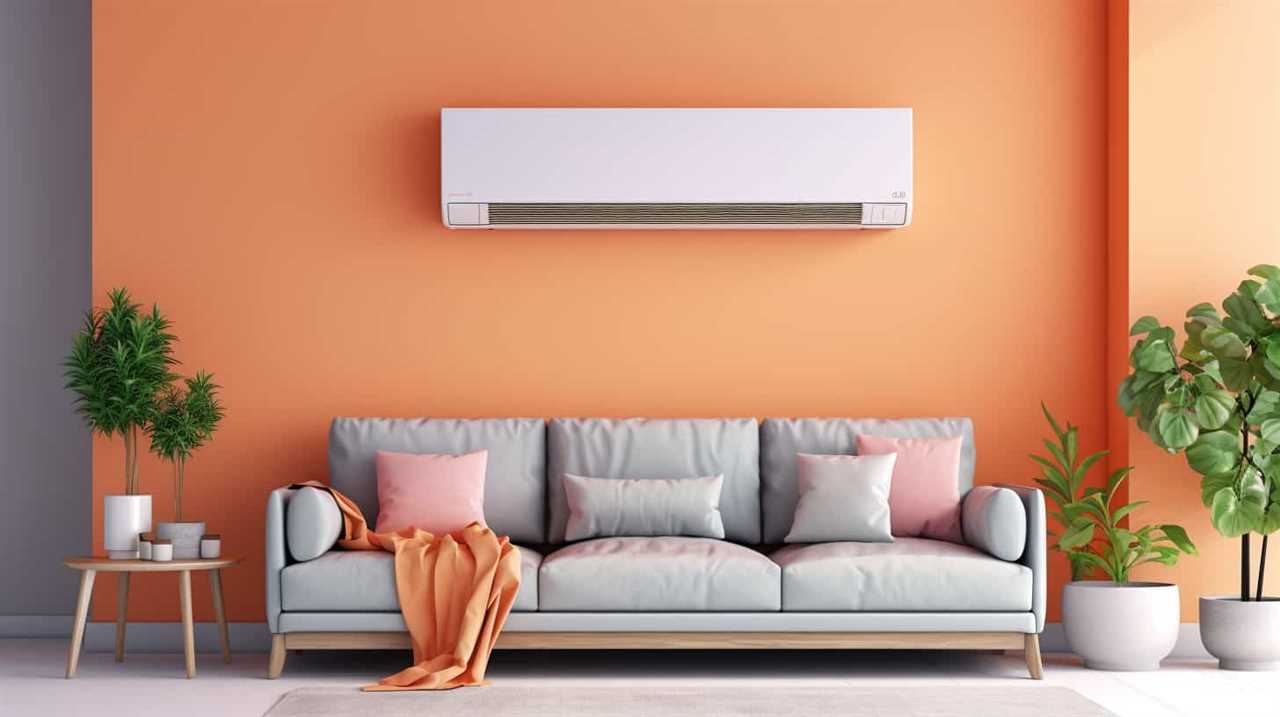
Conducting a thorough cost analysis helps us understand the initial investment required for purchasing and installing a heat pump system. This includes the cost of the unit itself, any additional equipment needed, and the expenses associated with professional installation.
Once the initial costs are determined, we can then assess the payback period, which is the time it takes for the energy savings to offset the initial investment.
Factors to Consider When Choosing an Energy Efficient Heat Pump
We frequently consider several factors when choosing an energy efficient heat pump.
One crucial factor is the installation process. It’s important to evaluate the complexity and cost of installation before making a decision. Some heat pumps require specialized equipment or extensive modifications to the existing heating system, which can increase both the time and expense of installation.
Another factor to consider is the maintenance requirements of the heat pump. Regular maintenance is essential to ensure optimal performance and longevity. It’s important to understand the recommended maintenance schedule and any associated costs. Additionally, consider the availability of qualified technicians who can perform the necessary maintenance tasks.
Frequently Asked Questions
What Is the Average Lifespan of a Heat Pump and How Does It Compare to Other Heating and Cooling Systems?
The average lifespan of a heat pump is comparable to other heating and cooling systems. In terms of energy efficiency ratings, heat pumps are highly efficient, making them a cost-effective and sustainable solution for energy needs.
Are There Any Government Incentives or Rebates Available for Installing Energy Efficient Heat Pumps?
Yes, there are government incentives and rebates available for installing energy efficient heat pumps. These incentives encourage homeowners to adopt sustainable energy solutions and can significantly offset the initial cost of installation.
Can a Heat Pump Effectively Cool a Home in Hot Climates?
Yes, a heat pump can effectively cool a home in hot climates. The heat pump’s efficiency allows it to extract heat from the indoor air and transfer it outside, providing a comfortable and energy-efficient cooling solution.
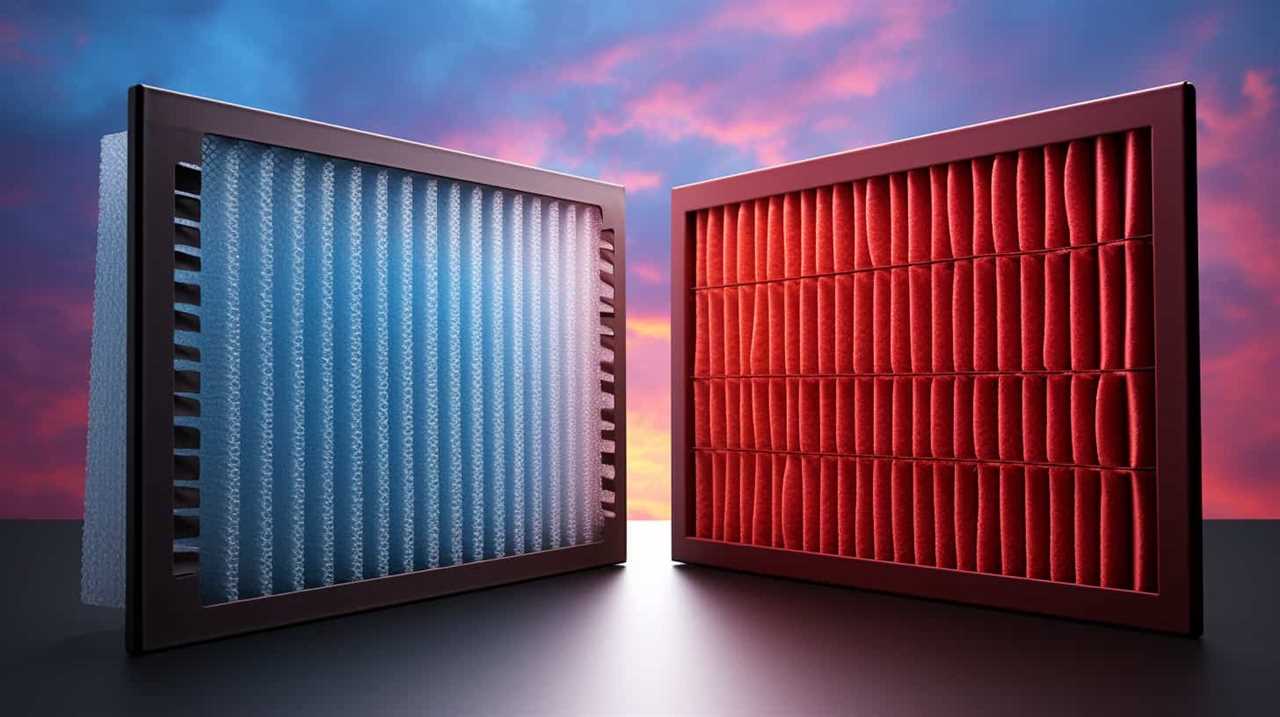
How Noisy Are Heat Pumps When They Are Operating?
Heat pump noise levels can vary depending on factors such as the model, installation, and maintenance. However, there are effective heat pump noise reduction techniques available, such as sound barriers and vibration isolation.
Are There Any Maintenance Requirements or Costs Associated With Owning a Heat Pump?
There are maintenance requirements and costs associated with owning a heat pump. Regular maintenance, such as cleaning and checking the filters, is necessary to ensure efficient operation. Additionally, there may be costs for repairs or professional servicing.
What Makes Heat Pumps a Viable Option in Renewable Energy Systems?
Heat pumps in renewable energy systems offer a viable solution for reducing greenhouse gas emissions. These pumps capitalize on the natural heat from the environment and transfer it indoors, providing efficient heating and cooling. By utilizing renewable energy sources such as air, water, or geothermal, heat pumps can significantly reduce reliance on fossil fuels, making them an environmentally friendly option. Furthermore, their ability to operate in various climates and provide year-round comfort makes heat pumps a practical choice for sustainable energy systems.
What are the Benefits of Using Efficient Heat Pumps to Cut Power Costs?
Efficient heat pumps are a valuable investment for reducing power costs. These pumps transfer heat from one area to another, providing both heating and cooling capabilities. By utilizing the outside air to heat or cool your home, they consume less energy than traditional HVAC systems. Additionally, efficient heat pumps offer zoning options, allowing you to control the temperature in specific areas, saving even more on energy consumption. Embracing these pumps not only cuts power costs, but also promotes sustainability.
Are Energy-Efficient Heat Pumps an Affordable Solution for Fixing Climate Control?
Energy-efficient heat pumps are an affordable solution for fixing climate control issues. These pumps effectively heat or cool spaces by transferring heat from one area to another, unlike traditional heating and cooling systems. With their advanced technology, energy-efficient heat pumps offer cost savings due to their lower energy consumption. They are an ideal choice for environmentally conscious individuals looking for efficient climate control solutions.
Conclusion
In conclusion, heat pumps offer a promising solution for affordable and energy-efficient heating and cooling. Symbolizing progress and sustainability, these innovative devices can significantly reduce energy consumption and lower utility bills.
By considering factors such as energy efficiency ratings, environmental benefits, and return on investment, individuals can make informed decisions when selecting an energy-efficient heat pump.
Embracing this technology isn’t only cost-effective but also a step towards a greener and more sustainable future.
-

 Residential and Commercial Applications2 weeks ago
Residential and Commercial Applications2 weeks agoBest Amana Heat Pump Reviews
-

 Thermal Energy Transfer2 weeks ago
Thermal Energy Transfer2 weeks agoBreakthroughs in Modern Heat Pump Systems: Thermal Energy Edition
-

 Residential and Commercial Applications2 weeks ago
Residential and Commercial Applications2 weeks agoBest Heat Pump
-

 Geothermal Heat Pumps3 months ago
Geothermal Heat Pumps3 months agoUpgrade Your Comfort with Our Efficient HVAC Systems
-

 Air Conditioning3 months ago
Air Conditioning3 months agoExploring Energy-Efficient Air Conditioning Heat Pumps
-

 Geothermal Heat Pumps3 months ago
Geothermal Heat Pumps3 months agoInnovative Geothermal Heat Pump Manufacturers Revolutionize Energy Efficiency
-

 Thermal Energy Transfer1 month ago
Thermal Energy Transfer1 month agoBoost Your Heat Pump Efficiency: Interactive Guide
-

 Residential and Commercial Applications2 weeks ago
Residential and Commercial Applications2 weeks agoBest Portable Heat Pump Heat & AC










